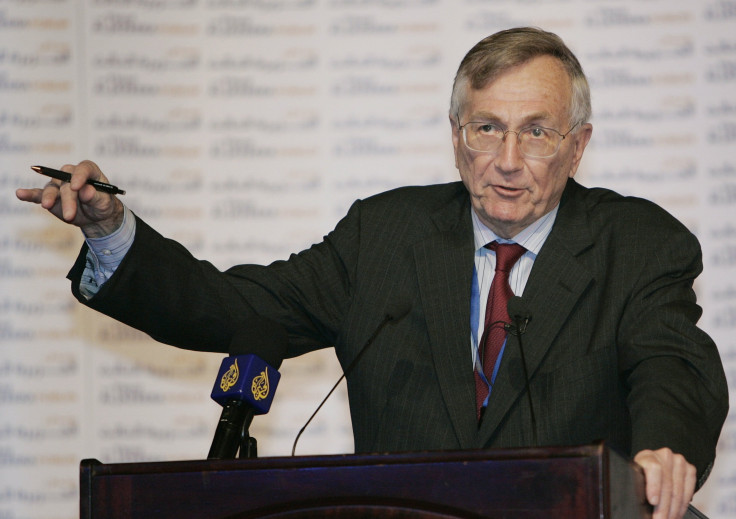Seymour Hersh Has A Six-Letter Word For The State Of The Media Business

Seymour Hersh doesn’t want your pity.
The legendary investigative journalist sat before a packed room at the main branch of the New York Public Library on Tuesday with his legs stretched out and his hands behind his head, holding court as he tossed out explosive scoops and rumors like candy. Hersh, famous for uncovering stories from torture at Abu Ghraib to the My Lai massacre in Vietnam, spoke about his critics, the state of media and his new book, “The Killing of Osama bin Laden.”
“I knew everyone was gonna be dead against this,” Hersh said of his book, which challenges the official narrative of how the head of al Qaeda was taken out by U.S. forces in the Pakistani city of Abbottabad.
“When you ask me about the things people say about me — Boo hoo,” Hersh said. “Boo hoo!”
Talking a mile a minute, he interrupted himself throughout the evening to sprinkle in cryptic anecdotes, political gossip, tales of secret war crimes, and ominous predictions. He alternated between winding soliloquies and sharp one-liners.
On his detractors in the media, Hersh said it goes with the territory. “It’s a very bitchy business,” he said.
On his former employer the New York Times: “They’re clearly hemorrhaging money. It’s not their fault.” (Hemorrhaging may be a bit strong, but the latest quarterly earnings report from the New York Times Co. wasn’t exactly cheery reading. Revenue was down 6.8 percent, or $14 million.)
Hersh also lamented the state of media, arguing that young journalists now have way more pressure on them than he did at their age. “What they do now is so much work, they have to file all the time, get one story in, then two stories up on the internet.” Several in the audience nodded.
Then came the prophecies. “By the way,” he said after the topic of Libya briefly came up, “we haven’t heard the last of Hillary Clinton on Libya. I’m not talking about Trump.” He later hinted that the 2012 attack on the U.S. consulate in Benghazi may have had something to do with America’s decision to kill a high-ranking member of a Libyan militia.
The meat of the talk, though, was about his blockbuster report on bin Laden. Based on a 10,000-word piece he wrote for the London Review of Books last year, Hersh’s account relies on American and Pakistani sources and dismisses the official version as something out of a “Lewis Carroll” fantasy.
“[The U.S. story] doesn’t work — but it worked for the press,” Hersh sighed to his interviewer, fellow journalist and ex-New York Times reporter Chris Hedges.
The U.S. account (which changed slightly over time ) is that after months of painstaking intelligence gathering, President Barack Obama ordered the now-famous SEAL Team 6 into Abbottabad without the knowledge of the Pakistanis, and that bin Laden’s life ended in a firefight inside his compound.
Hersh’s version, on the other hand, says it was in fact a disgruntled Pakistani intelligence officer who approached the Americans with bin Laden’s location in exchange for a hefty reward. The tipster, Hersh reported, knew that the Pakistani intelligence services had been sheltering and monitoring bin Laden as more a less a hostage in Abbottabad for years.
The U.S. struck a deal with Pakistan to cross the border and kill bin Laden in his compound (not a dramatic fight but a “turkey shoot,” Hersh added), agreeing to protect Pakistan’s reputation by telling the public bin Laden died in a drone strike in the mountains. At the last minute, due to political considerations, Hersh said, the administration decided to double-cross the Pakistanis and announce the killing as a daring raid on the compound.
Many of his peers joined the White House in dismissing Hersh’s story, from CNN’s bin Laden expert Peter Bergen to the news aggregators at Vox.com, who called it a “conspiracy theory.” Still, days after Hersh’s story dropped, NBC News released a report co-bylined by Andrea Mitchell confirming the existence of the Pakistani tipster — though it was later tweaked to pull back on outright confirmation of Hersh’s account. The New York Times also published a piece, by its North Africa correspondent Carlotta Gall, backing up some of Hersh’s version.
Critics noted that the New Yorker, where Hersh has contributed for years, chose not to run with his initial bin Laden piece. When asked why, Hersh waved off the question.
“I don’t believe in self-immolation,” he said to laughs, “so I’m gonna let that go.”
Both the Times and New York magazine reported last year that Hersh’s longtime editor David Remnick passed on the bin Laden piece. Those suspicious of Hersh’s story suggested this was evidence that the piece wasn’t up to snuff, and ungraced by the notoriously thorough fact checkers at the New Yorker.
But Hersh told International Business Times that the fact-checkers he used on the LRB piece were people he previously worked with at the New Yorker.
At one point, a member of the audience asked Hersh whether by dropping all his stories and scooplets during his talks, he was irresponsibly publishing them. Hersh admitted he’d been called out on it before.
“Could anything I’ve said be used to start an investigation?” he said, staring down the questioner. A second later, he loosened up. “Still, I take your point.”
“I should probably learn to keep my mouth shut,” he said.
Later, he confessed that is easier said than done. In the middle of an offhand story about brutal U.S. war crimes in Afghanistan, he stopped. “You ask, why am I telling you this horror story? Why not?
“I’m tired of carrying these around with me,” he added. “You have it.”
© Copyright IBTimes 2025. All rights reserved.






















